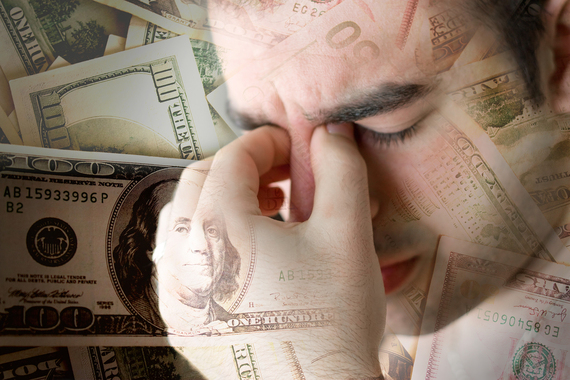
The average credit card holder owes more than $15,000, last year's senior class graduated with the highest student debt burden in history, and one-third of Americans are delinquent on at least one loan. All told, we owe a staggering $11.4 trillion in debt and the number is only getting larger.
For many of us, the debt burden from homes, cars, education, and credit cards takes a toll in ways we often don't expect. Even if we don't look closely at our statements, we know we're accruing interest and paying a substantially higher sticker price for the goods we've purchased. Many of us don't realize, though, how our debt affects us beyond our bank accounts.
According to the American Psychological Association, most of us see our money situation as a significant source of chronic stress. Lenders give us the power to leverage our future earnings to get earlier access to a family home, an elite education, or a nicer car. But the question to always ask yourself before going into debt is this, How high is the real cost? And, is that cost really worth it? After all, almost nothing is worth it if it means creating a life filled with stress.
1. Interest. The average U.S. mortgage balance is $157,000. Assuming one borrows at today's low interest rates (we'll use 4 percent here), the 30-year payback will total almost $270,000. That's 71 percent more than the original amount borrowed and that's for what most of us consider to be "good debt." Let's make a similar calculation for the average credit card holder's balance of $15,252 at 14.95 percent. It would take more than 31 years to pay off the balance by making the minimum required payment of $343.17 per month and, in the meantime, the loan would accrue over $18,000 in additional interest. Those numbers are enough to raise anyone's blood pressure.
2. Increased Risk for Heart Attack. Research indicates that people who experience high stress about their debt are twice as likely to suffer a heart attack than were those who don't worry about their finances. They're also more likely to experience ulcers, migraines, depression, and lower back pain. In short, money woes can be hazardous to more than just your pocketbook.
3. Decreased Productivity. 83 percent of human resource professionals agree that personal finance challenges have a dramatic affect on overall employee performance, including inability to focus on work and overall employee stress. Of course, the worse one performs at work, the lower their chances of salary bumps, promotions, or other career-related opportunities.
4. Insomnia. More than 40 percent of adults report that they can't sleep at night, because of the stress they experience during the day. Less sleep leads to a no-win cycle of decreased productivity leading to more stress, which in turn leads to even less sleep.
5. Less Brain Power. Concerns about money creates such angst that they've been shown to decrease IQ by an incredible 13 points. That's the equivalent of how we feel when we lose an entire night of sleep. As any parent of a newborn or student who's pulled an all-nighter can attest, that's a significant brain drain.
Money worries cost us a lot more than just the cash, it turns out. To increase health and life satisfaction, we need to start looking at our cash flow from a different perspective. It pays to start thinking about the real costs of the choices we make, including the impact they have on our overall health and happiness. Because isn't that what we're really living for?
Photo credit: Bigstock Photo/arenacreative
